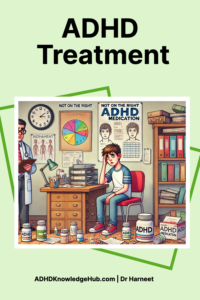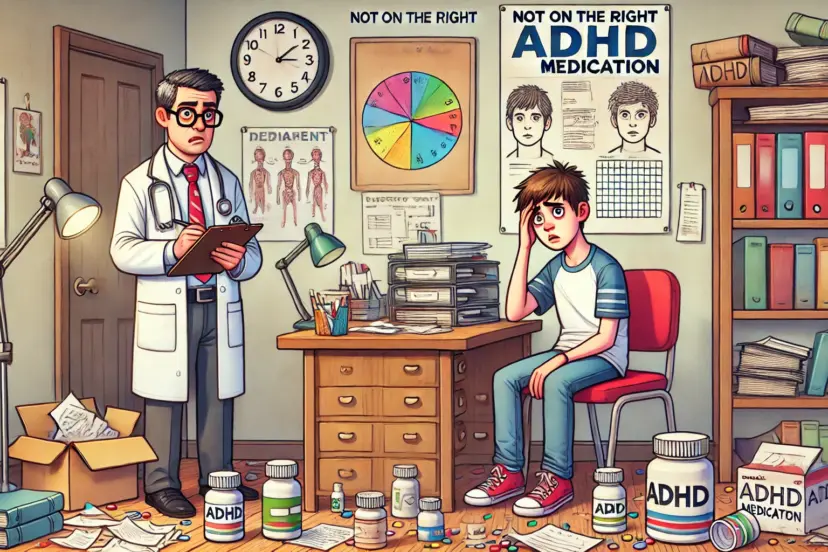Overcoming ADHD Treatment Gaps in an Overwhelmed UK Healthcare Service
Introduction
Have you ever felt like you’re falling through the cracks when it comes to healthcare? As a psychiatrist, I’ve seen many patients with ADHD struggle not because of the condition itself but due to the ADHD treatment gaps in our overwhelmed UK healthcare system. Today, let’s dive into the challenges and explore practical ways to overcome these barriers.
Understanding ADHD
What is ADHD?
ADHD, or Attention Deficit Hyperactivity Disorder, is a neurodevelopmental disorder characterized by symptoms of inattention, hyperactivity, and impulsivity. It’s not just a childhood condition; adults can suffer from it too, often struggling with work, relationships, and daily tasks.
Prevalence of ADHD in the UK
In the UK, ADHD affects about 5% of children and around 2.5% of adults. Despite its prevalence, many individuals remain undiagnosed or improperly treated due to various systemic issues.
Challenges in ADHD Treatment
Initial Diagnosis Difficulties
One of the biggest hurdles is getting a proper diagnosis. Many people, especially adults, go through life undiagnosed due to a lack of awareness and understanding of the condition. The initial assessment process can be lengthy and convoluted, further complicating the journey to effective treatment.
Short-term vs. Long-term Medications
ADHD medications are often classified into short-term and long-term options. Short-term medications work quickly but wear off within a few hours, whereas long-term medications provide sustained relief. However, many patients are unaware of these options and may give up on treatment if the initial prescription doesn’t meet their needs.
Finding the Right Medication: A Personal Journey
Imagine starting ADHD treatment with high hopes, only to find that the prescribed medication doesn’t work as expected. This was the case for one of my patients. The initial medication, a well-known brand, caused unpleasant side effects like anger and frustration. After discussing these concerns, we switched to a different brand. The new medication worked wonders, providing the focus needed without the adverse side effects. This experience underscores the fact that each person responds differently to ADHD medications, and finding the right brand can make all the difference. Open communication with healthcare providers is essential to tailor treatment to individual needs.
Common Side Effects of ADHD Medication
Side effects such as insomnia, appetite loss, and mood swings can deter patients from continuing their medication. Without proper guidance and follow-up, individuals might abandon their treatment prematurely.
Overwhelmed UK Healthcare System
Staffing Shortages
The UK healthcare system is facing a significant staffing crisis. With fewer doctors and specialists available, patients often experience delays in getting diagnosed and treated for ADHD.
Appointment Delays
Long waiting times for appointments are a common issue. It’s not unusual for patients to wait months, sometimes even a year, for an initial assessment or follow-up consultation. These delays can exacerbate symptoms and lead to a sense of helplessness.
Limited Follow-Up Care
Once diagnosed, continuous monitoring and follow-up are crucial. However, the overwhelmed system often falls short in providing regular check-ins, leaving patients to manage their condition with little support.
The Impact of Treatment Gaps
Effects on Daily Life
The treatment gaps can have profound effects on daily life. Individuals with untreated or inadequately managed ADHD may struggle with maintaining employment, managing relationships, and performing everyday tasks.
Long-term Consequences
Long-term consequences include increased risk of mental health issues such as depression and anxiety, substance abuse, and poor academic or work performance. These gaps can hinder personal and professional growth, trapping individuals in a cycle of underachievement and frustration.
Strategies to Overcome Treatment Gaps
Better Initial Assessments
Improving the initial assessment process is key. This means training more healthcare professionals to recognize and diagnose ADHD accurately and efficiently. Streamlining the diagnostic process can help more people get the help they need sooner.
Education on Medication Options
Patients need to be informed about their medication options. Understanding the differences between short-term and long-term medications can empower individuals to make better choices and stay on track with their treatment.
Improved Follow-Up and Monitoring
Regular follow-up appointments and consistent monitoring are crucial. This can be achieved by integrating ADHD management into routine healthcare visits and ensuring that patients have easy access to their healthcare providers for ongoing support.
Leveraging Technology for Support
Technology can play a significant role in bridging the treatment gaps. Telehealth services, online support groups, and mobile apps designed for ADHD management can provide continuous support and resources, making it easier for patients to stay engaged with their treatment plans.
Personal Stories and Testimonials
Hearing from others who have navigated similar challenges can be incredibly encouraging. Personal stories and testimonials can highlight the real-world impact of these treatment gaps and inspire hope and determination in those currently struggling.
Conclusion
Navigating ADHD treatment within the UK’s overwhelmed healthcare system can feel like an uphill battle. But by understanding the challenges and implementing practical strategies, we can bridge these gaps and ensure that everyone gets the support they need. Whether it’s through better assessments, education, follow-up care, or leveraging technology, there are ways to make the journey smoother and more effective.
FAQs
1. What should I do if I suspect I have ADHD but can’t get a quick appointment?
Start by keeping a detailed record of your symptoms and how they impact your daily life. This information will be valuable when you finally see a healthcare provider. You can also seek support from online resources and support groups in the meantime.
2. Are there any non-medication treatments for ADHD?
Yes, behavioral therapy, cognitive-behavioral therapy (CBT), and lifestyle changes such as improved diet and exercise can be effective. These approaches can complement medication or, in some cases, serve as alternative treatments.
3. How can technology help in managing ADHD?
Technology offers various tools such as telehealth services for virtual consultations, mobile apps for medication reminders and tracking symptoms, and online communities for support and advice.
4. What are the long-term risks of untreated ADHD?
Untreated ADHD can lead to significant challenges, including mental health issues like anxiety and depression, substance abuse, and difficulties in personal and professional life. Early and effective treatment is crucial to mitigating these risks.
5. How can I advocate for better ADHD services in my area?
You can join or form advocacy groups to raise awareness and push for better services. Engaging with local healthcare providers, participating in public forums, and using social media to highlight the issues can also make a difference.

*We may earn a commission for purchases made using our links. Please see our disclosure to learn more.




